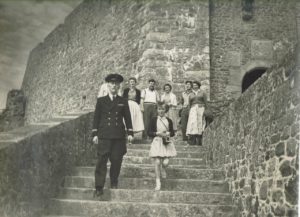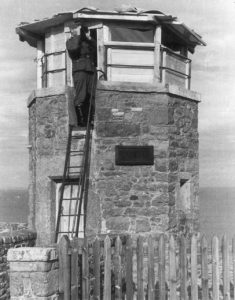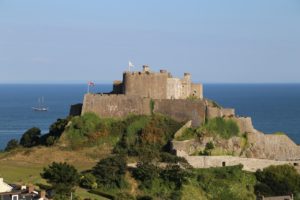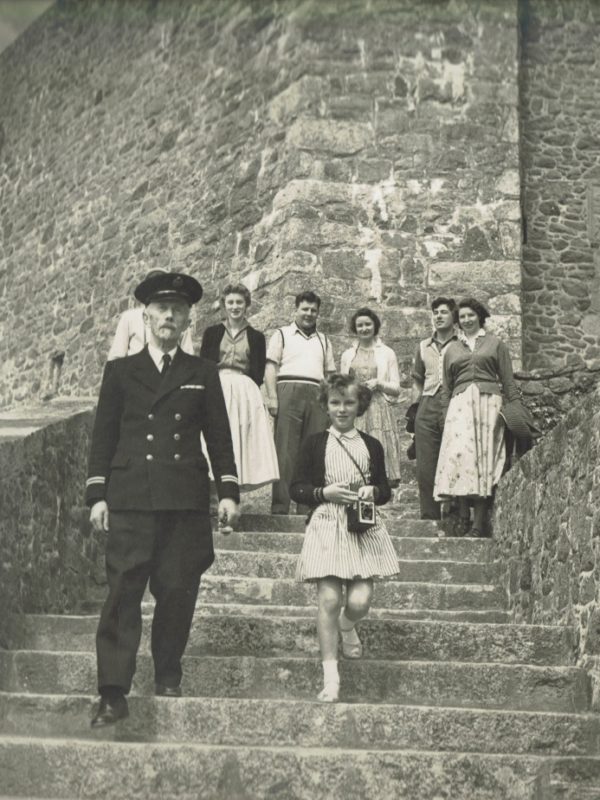A day after Victory-in-Europe Day, the 9th of May is now celebrated as Liberation Day, a public holiday in the Channel Islands. Here are a few of my family’s stories from the time of liberation from the German Occupation of Jersey.
My mother Nancy and her parents Josue (Joe) and Lilian Dorey had returned to Jersey in 1937 from Canada. Joe had lived there for some 25 years or so, apart from 5 years on the Western Front with the Canadian Infantry, and some time shortly after the War, when he had married my Grandmother in Jersey. After their arrival back in Jersey, my grandfather was appointed as the “Guardien” of Gorey Castle. The Castle is an imposing fortress built on a promontory on the east coast of Jersey facing the French coast some 12 miles away. It had been Jersey’s main defence and deterrent against the French between the 13th and 16th centuries.
After 1600, the Castle fell into decline as regards military use, but nonetheless had been used in the English Civil War as a Royalist stronghold. Later it was used as a prison, and also as soldiers’ barracks. By the mid-nineteenth century, it was no longer required for any military purpose and had become an ancient monument, attracting many sight-seeing visitors. As Guardien, it was my grandfather’s role to look after the Castle on a day to day basis, and guide visitors around its towers, turrets and batteries.
One of the first recollections of my mother of June 1940 was of the owners of a house on the other side of the Castle Green rushing into the small cottage in the Castle where she and my grandparents lived (now the Castle Café) and throwing their keys onto their kitchen table. They said that they were off to catch the last boat out of the Island taking evacuees to England and would my grandparents look after their house and belongings. This act would subsequently prove a godsend for my family!
Jersey had by that time been hastily de-militarised and declared an Open Town. It was realised that neither was the defence of the Channel Islands strategically justified in the light of the imminent German attack against the British mainland itself, nor did Britain have the necessary resources to do so after the defeat and evacuation at Dunkirk. At least, it was believed, as an Open Town, the Germans would not attack and bomb the Islands, which would cause large civilian casualties.
The Germans arrived about a week later and it wasn’t long before they came to the old medieval fortress to inspect it. It didn’t take the Germans long to begin consolidating their occupation by mounting sentries and guns around the Island and setting up observation points around the Island. Gorey Castle, perched on its lofty rocky outcrop with views across all of the eastern half of the Island and France, became one of those observation points.
As a result, the Castle, and the harbour and pier below, became a military zone and all inhabitants were evicted by the Germans. My mother and grandparents, having been entrusted with the keys of the house just on the opposite side of the road from the Castle, were fortunate. They moved their home and belongings a few hundred yards and that was their home until liberation in May 1945.
It is a known fact that before the Germans arrived, they had ordered their forces to treat the Islands’ population with great respect, provided of course that the population did not engage in active resistance to the occupation. This was to be a model for the future occupation of Great Britain. The Islanders noticed this however much they disliked the invading foreigners, and every day of occupation was a day too long. My grandfather Joe, having fought the Germans for 4 years in the Great War, the war to end all wars, would certainly not have enjoyed the prospect of occupation. He was, however, in an unusual position in comparison to many other Island residents now stuck in German occupied territory.
Firstly, as the Guardien and as a former old soldier – decorated, having been awarded the Military Cross on the very day that Passchendaele was captured on 6 November 1917 – he would have been held in some respect by the professional officers and soldiers of the Wehrmacht. Secondly, he was also a true Jerseyman, with family roots which went back generations, and as such would not have fallen into the category of an English resident, who were subsequently deported to Germany. And thirdly, he had unusually learnt German at Silk’s Academy, a small school which had existed in the early twentieth century in Jersey. He was thus able to speak to and understand the new occupiers.
As a Jerseyman, like many others, he had an illegal wireless set on which he listened to the BBC. As a country resident (rather than a town one) and being from a farming family, he knew the farmers – indeed many were close and distant relations. During the Occupation, he had “invented” a device, which upon winding a handle would send an electric current through electrodes to electrocute a pig prior to slaughter. He became someone in demand on the nearby country farms, when an illegal pig (one not registered as required by the Germans) was to be slaughtered as quietly as possible. Any noise made would have risked the swift arrival of and arrest by the German authorities.
But despite these illegal activities, Joe still retained a key to Gorey Castle, with the full permission of the Germans. He could enter it at any time (curfew excepted) to tend his vegetable garden which was situated in the Outer Ward of the Castle. Throughout the Occupation, he would come and go from the German occupied Castle in the military zone and produce vegetables for the family and friends. By mid to late 1944, when the Channel Islands had been cut off by the Allies’ retaking Normandy and Brittany in France, these vegetables meant that the family were fed. Despite that the Germans also suffered food shortages themselves as a result of the Allies’ blockade, not one vegetable was ever taken from the garden by them during that period of hardship before liberation, despite that they were starving too.
Liberation!
This brings us to the liberation of Jersey in May 1945. On 8th May, Jersey was buzzing with the news heard on the BBC that Germany had surrendered. In Europe, the war had ended. The Islanders came out of the homes in the expectation that the Germans in the Island would surrender and British troops would be landing later in the day to accept it. Bunting was being prepared and the Bailiff of Jersey, Alexander Coutanche, had hoisted the Union Jack and Jersey flag on the Court Building in St Helier as a large crowd listened to Churchill’s speech at 3 o’clock that afternoon. But no British troops arrived. The Bailiff issued a statement requesting that Islanders remain calm and that hopefully more news of the arrival of the British would be available soon. There was natural disappointment amongst the population that their liberators had not arrived and that German swastika flags were still flying over the German bunkers, depots and fortifications around the Island. In the circumstances, they would have to wait until tomorrow to see them gone.
My grandfather had, however, other thoughts according to the family story. When he and his family had been evicted from Gorey Castle by the Germans, he had carefully removed the Union Jack and Jersey flags which had until the German Occupation flown from the flagpoles at the Castle. He had kept them safely tucked away until they could be flown again when Jersey was hopefully liberated.
Knowing my grandfather’s character, and probably in the expectation that he wasn’t going to be stopped by the Germans, he wasn’t going to wait. Late on the afternoon of 8th May, he got the flags out again. He marched from his home to the Castle, up to the main gates and into the Castle. He climbed the many steps to the top, past the Germans still there, and removed the hated German flags. In their place he hoisted the Union Jack and Jersey flag. I like to think that he may have been wearing his Guardien uniform, but I don’t know that. Being 8th May, the day before Liberation Day, the flags were probably the first British ones raised on a German held building, and before those raised with great cheer the next morning in Town, when the British Tommies arrived.
The following morning, 9th May, Liberation Day, the whole family climbed onto my grandmother’s brother Uncle “Pop” Arthur Mallet’s farm lorry, filled with just enough petrol which had been saved for this day. They went down to Town with thousands of others to meet the Tommies coming ashore and parked outside the Pomme D’Or Hotel. My mother remembers the day well. Her abiding memory of Liberation Day is that everyone was so happy and excited that the 5 long years of occupation had come to an end – and the sweets which the Tommies gave to the children!
Marc Yates
9th May 2017




